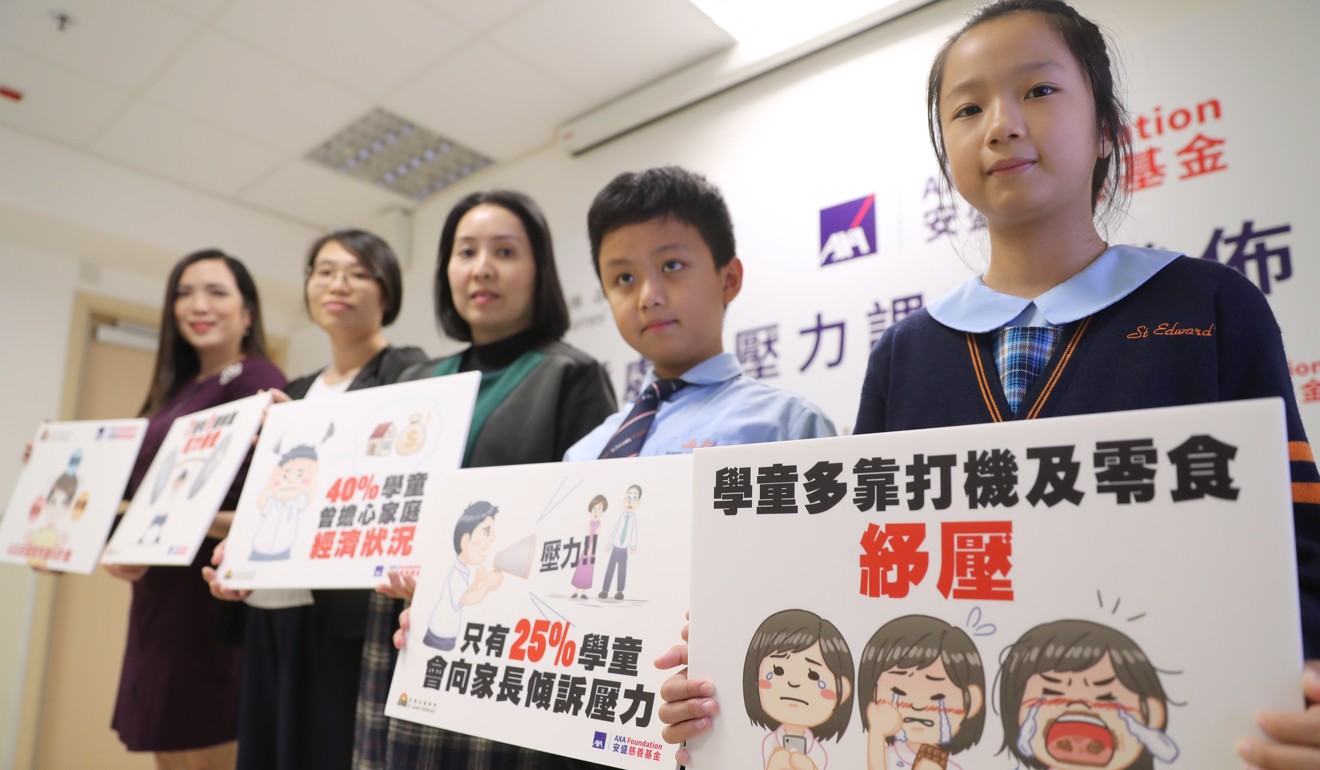
1 in 7 Hong Kong pupils from poor families ‘overloaded with stress’, and most turn to video games or food
- Survey finds 14 per cent rated their stress level at the maximum on a scale from 1 to 10, and many seek solace in the internet
One in seven Hong Kong pupils from low-income families are “overloaded with stress”, according to a survey, and most turn to video games or food for relief.
The study by social welfare organisation St James’ Settlement and insurance group AXA found almost half sought solace in the internet or electronic games.
Some 14 per cent of pupils rated their stress level at the maximum on an index from 1 to 10 when questioned in October.
Researchers interviewed 807 pupils from low-income families between Primary Three and Six.
A further 19 per cent put their stress level at between 7 and 9, while 32 per cent gave a rating from 4 to 6. The remaining 32 per cent said they were experiencing low levels of stress.

St James’ Settlement expressed concern about how children were choosing to deal with the pressure, with 44 per cent turning to electronic games or the web.
“This shows children don’t really know what the most appropriate ways are to alleviate stress,” said Connie Ng Man-yin, the NGO’s senior manager of charity services.
Another 33 per cent dug out their favourite snacks, while only 22 per cent chose exercise – seen as the best option.
Half were not physically active for at least 30 minutes a day.
Tiger mothers, stressed kids and Asia schooling focus of new photo and video show
The survey did not cover the reasons for the stress, but Ng said the top three factors were usually concerns over academic results, interpersonal relationships and family finances.
A separate study in May by the Hong Kong Playground Association showed a third of 3,177 Hongkongers aged six to 24 were suffering from stress, anxiety or depression.

According to the Hospital Authority, 32,000 children or teenagers were diagnosed with mental health problems in 2016 and 2017. Some 20,000 were below 12 years old.
Poon Cheuk-lam, 10, is usually at the top of her class. She said she would feel stressed out if not performing well in exams, largely due to worries about her parents being disappointed.
“Sometimes I worry that my grades are not good enough to get into a good school ... My mother would be a bit unhappy if I didn’t do well, but she always tells me it’s fine as long as I try my best,” Poon said.
Hong Kong pupils are under tremendous pressure to perform well academically in a school system that favours exams and long hours of rote learning.
How mindfulness and meditation turned a workaholic’s life around, and how they can help you beat stress
The St James’ Settlement survey also polled 791 parents and found 78 per cent believed their children would open up to them about stress. However, only 25 per cent of the 807 pupils polled said they had.
“Usually, children from low-income families are more independent and try to handle it themselves if they feel they are capable,” Ng said.
Chow Suk-ping, a teacher at St Edward’s Catholic Primary School in Kwun Tong, said parents should learn to listen to their children before doling out punishments, advice or judgment.
Eighty underprivileged pupils from four primary schools have taken part in a pilot programme organised by St James’ Settlement and the AXA Foundation aimed at teaching children emotion management skills and better ways to cope with stress. The NGO plans to expand the programme to cover about 400 students in the next three years, if an application for a government grant is successful.

